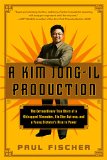Summary | Excerpt | Reviews | Beyond the Book | Readalikes | Genres & Themes | Author Bio

The Extraordinary True Story of a Kidnapped Filmmaker, His Star Actress, and a Young Dictator's Rise to Power
by Paul Fischer INTRODUCTION
August 1982
The last thing Shin Sang-Ok remembered was sitting in his cell, unable to feel his own heartbeat, too weak to move or stand. He had been held in a North Korean detention center for almost two years, crammed inside a solitary cell barely big enough to lie down in, with one tiny slit of a window high up on the wall and thick steel bars across it. Bugs teemed through cracks in the floor. Except for a thirty-minute lunch break, a ten-minute supper, and a thirty-minute "sunning" period in the prison yard, he was required to sit in the exact same position all day, head bowed and motionless, absolutely stock-still, or suffer even greater punishment.
He had been on a hunger strike for five days when he lost consciousness. Now, awakening in a prison infirmary, he struggled to breathe. The August air was hot and thick with humidity. A blinding headache blurred his thoughts. His mouth felt dry and metallic, and his stomach was seized with cramps. The simplest movement hurt.
"This guy is probably going to make it," a voice said. "He just moved his toes."
Shin blinked his eyes open. An investigator was standing by his bed, a high-ranking military officer at his side. A prison guard stood attentively behind them. The two men talked among themselves in agitated tones, never addressing Shin directly. After a short while, all three men left.
It was then that Shin became aware of another prisoner in the room. The convict pulled a chair up by Shin's bed and brought him a tray of food. Shin knew him. He was a trusty, an inmate given charge of basic tasks around the prison— sweeping, mopping, serving food, and delivering messages— in exchange for more freedom and time out of his cell. Often a trusty was also a snitch; it was the way he had obtained his position and the way he kept it.
"Eat," the trusty said.
Shin looked at the tray: rice soup, a bowl of stew, and an egg. By prison standards the food was luxurious. Shin turned it down anyway. When the trusty spooned some soup out of the bowl and tried to feed him, Shin pinched his mouth shut tight. "Take it," the trusty insisted. "It will do you good. You need to eat." The man persisted, and eventually Shin gave in. At first, the thought of food made him feel sick, but one taste and his hunger rushed back. He quickly devoured most of the meal but, in gratitude, left some of it for the trusty.
"What happened?" Shin asked.
"You missed roll call yesterday," the trusty said. "I went to check on you and found you unconscious on the floor. You should have seen their faces. They were so scared they'd let you die. They sent for the doctor and he checked your pulse and had you taken here. They'll be relieved to know you will live."
The trusty eyed him carefully. "Now I really know you're an important person. No one cares here if a prisoner dies. I went on hunger strike once. They told me that a man dies in ten days from hunger, a woman fifteen. It didn't take me long to give in and start begging for food. I've heard of important prisoners on hunger strike being held down and force-fed through a funnel— they wouldn't even do that for you. For the sake of your pride, they said. That's how important you are."
"Who was that officer?" Shin asked. "The stranger?"
It was the Minister of People's Security, the trusty explained, the head of all law enforcement in the country. "That's the first time I ever saw the Minister of People's Security come all the way out to the prison just because some prisoner was starving to death. He raised all kinds of hell."
"You must be joking."
The trusty shook his head, deep in thought. "You must be very favored for them to care what happens to you. Do you know someone? Who do you know?"
Shin closed his eyes. He thought of the prison around him: of the inmates tapping on each other's cell walls to communicate, of the ones suddenly and arbitrarily taken out to the yard to be executed, of their cruel and violent guards. For almost two years he had lived in brutal, meaningless captivity. Yet he didn't know a single person in the entire country.
Excerpted from A Kim Jong-Il Production by Paul Fischer. Copyright © 2015 by Paul Fischer. Excerpted by permission of Flatiron Books. All rights reserved. No part of this excerpt may be reproduced or reprinted without permission in writing from the publisher.
Never doubt that a small group of thoughtful, committed people can change the world...
Click Here to find out who said this, as well as discovering other famous literary quotes!
Your guide toexceptional books
BookBrowse seeks out and recommends the best in contemporary fiction and nonfiction—books that not only engage and entertain but also deepen our understanding of ourselves and the world around us.